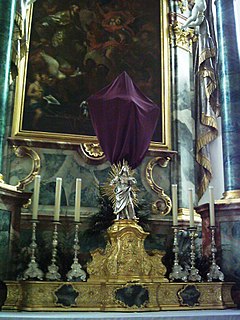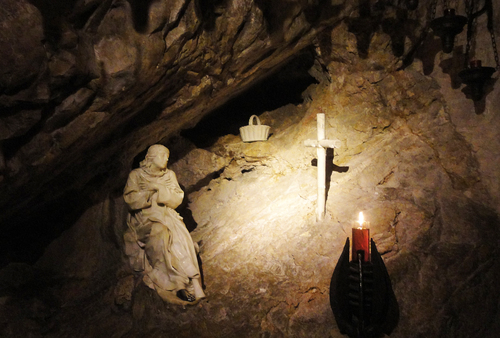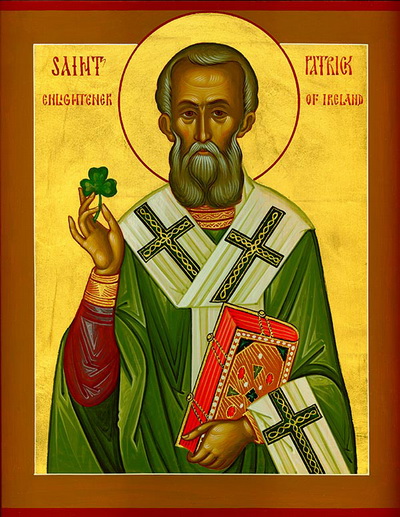
The history of the feast
In most pre-twentieth century Benedictine breviaries, this day is marked as the feast of St Robert of Molesmes, one of the founders of the Cistercian Order.
**Some of the French Congregations, however, seem to have celebrated the feast of St Hugh on this date either instead of St Robert (Cluniacs) or as well as that feast (Solesmes). The 1897 Liber Antiphonarius lists the feast of St Robert in the main calendar, but also adds St Hugh to that day, while preserving separate feasts for St Odilo (Jan 19), Maiolus (May11) and Odo (Nov 27) for their own congregation.In (I think) the early twentieth century clean out of the Benedictine calendar though, the ongoing war between the Black and White monks presumably heated up once more, because the feast of St Robert of Molesmes was replaced by one celebrating several of the Cluniac abbots instead (combining several separate feasts celebrated by some Congregations only), against whom the Cistercian reform was rather directed.
Curiously, though, one of the most important Cluniac abbots, who successfully defended his congregation from the attacks of the Cistercians, Blessed Peter the Venerable, didn't actually make the list for the celebration of today's feast at all in the 1963 calendar. This may be because he was never officially canonised.
The deficiency was, however, rectified in the 1975 revision of the calendar.
The Solesmes Congregation, however, continue to observe the feasts of the various abbots on separate dates, while Le Barroux celebrates the feast of the Cluny abbots, but retains St Robert as a commemoration.
Matins texts and readings for the feast
At Matins in the 1963 breviary, the invitatory antiphon is Exsultent in Domino, and the chant for it can be found in the Liber Responsorialis, page 162. The hymn, Rex gloriose Praesulum, is the same as for Vespers so can be found in the Antiphonale Monasticum.
The one reading is from Letter 4 of St Peter Damian to St Hugh, but I'm afraid I have been unable to find it online in either Latin or English. Pope Benedict XVI's comments on the Cluniac reform, however, might be a good substitute, so I have reproduced it below. Pope Benedict also provided a couple of other General Audiences on the saints in question which are well worth a read, so herewith some links to them, viz:
- St Peter the Venerable; and
- St Odo.
This morning I would like to speak to you about a monastic movement that was very important in the Middle Ages and which I have already mentioned in previous Catecheses. It is the Order of Cluny which at the beginning of the 12th century, at the height of its expansion, had almost 1,200 monasteries: a truly impressive figure! A monastery was founded at Cluny in 910, precisely 1,100 years ago, and subsequent to the donation of William the Pious, Duke of Aquitaine, was placed under the guidance of Abbot Berno. At that time Western monasticism, which had flourished several centuries earlier with St Benedict, was experiencing a severe decline for various reasons: unstable political and social conditions due to the continuous invasions and sacking by peoples who were not integrated into the fabric of Europe, widespread poverty and, especially, the dependence of abbeys on the local nobles who controlled all that belonged to the territories under their jurisdiction. In this context, Cluny was the heart and soul of a profound renewal of monastic life that led it back to its original inspiration.
At Cluny the Rule of St Benedict was restored with several adaptations which had already been introduced by other reformers. The main objective was to guarantee the central role that the Liturgy must have in Christian life. The Cluniac monks devoted themselves with love and great care to the celebration of the Liturgical Hours, to the singing of the Psalms, to processions as devout as they were solemn, and above all, to the celebration of Holy Mass. They promoted sacred music, they wanted architecture and art to contribute to the beauty and solemnity of the rites; they enriched the liturgical calendar with special celebrations such as, for example, at the beginning of November, the Commemoration of All Souls, which we too have just celebrated; and they intensified the devotion to the Virgin Mary. Great importance was given to the Liturgy because the monks of Cluny were convinced that it was participation in the liturgy of Heaven. And the monks felt responsible for interceding at the altar of God for the living and the dead, given large numbers of the faithful were insistently asking them to be remembered in prayer. Moreover, it was with this same aim that William the Pious had desired the foundation of the Abbey of Cluny. In the ancient document that testifies to the foundation we read: "With this gift I establish that a monastery of regulars be built at Cluny in honour of the Holy Apostles Peter and Paul, where monks who live according to the Rule of St Benedict shall gather... so that a venerable sanctuary of prayer with vows and supplications may be visited there, and the heavenly life be sought after and yearned for with every desire and with deep ardour, and that assiduous prayers, invocations and supplications be addressed to the Lord". To preserve and foster this atmosphere of prayer, the Cluniac Rule emphasized the importance of silence, to which discipline the monks willingly submitted, convinced that the purity of the virtues to which they aspired demanded deep and constant recollection. It is not surprising that before long the Monastery of Cluny gained a reputation for holiness and that many other monastic communities decided to follow its discipline. Numerous princes and Popes asked the abbots of Cluny to extend their reform so that in a short time a dense network of monasteries developed that were linked to Cluny, either by true and proper juridical bonds or by a sort of charismatic affiliation. Thus a spiritual Europe gradually took shape in the various regions of France and in Italy, Spain, Germany and Hungary.
Cluny's success was assured primarily not only by the lofty spirituality cultivated there but also by several other conditions that ensured its development. In comparison with what had happened until then, the Monastery of Cluny and the communities dependent upon it were recognized as exempt from the jurisdiction of the local Bishops and were directly subject to that of the Roman Pontiff. This meant that Cluny had a special bond with the See of Peter and, precisely because of the protection and encouragement of the Pontiffs the ideals of purity and fidelity proposed by the Cluniac Reform spread rapidly. Furthermore, the abbots were elected without any interference from the civil authorities, unlike what happened in other places. Truly worthy people succeeded one another at the helm of Cluny and of the numerous monastic communities dependent upon it: Abbot Odo of Cluny, of whom I spoke in a Catechesis two months ago, and other great figures such as Eymard, Majolus, Odilo and especially Hugh the Great, who served for long periods, thereby assuring stability and the spread of the reform embarked upon. As well as Odo, Majolus, Odilo and Hugh are venerated as Saints.
Not only did the Cluniac Reform have positive effects in the purification and reawakening of monastic life but also in the life of the universal Church. In fact, the aspiration to evangelical perfection was an incentive to fight two great abuses that afflicted the Church in that period: simony, that is the acquisition of pastoral offices for money, and immorality among the secular clergy. The abbots of Cluny with their spiritual authority, the Cluniac monks who became Bishops and some of them even Popes, took the lead in this impressive action of spiritual renewal. And it yielded abundant fruit: celibacy was once again esteemed and practised by priests and more transparent procedures were introduced in the designation of ecclesiastical offices.
Also significant were the benefits that monasteries inspired by the Cluniac Reform contributed to society. At a time when Church institutions alone provided for the poor, charity was practised with dedication. In all the houses, the almoner was bound to offer hospitality to needy wayfarers and pilgrims, travelling priests and religious and especially the poor, who came asking for food and a roof over their heads for a few days. Equally important were two other institutions promoted by Cluny that were characteristic of medieval civilization: the "Truce of God" and the "Peace of God". In an epoch heavily marked by violence and the spirit of revenge, with the "Truces of God" long periods of non-belligerence were guaranteed, especially on the occasion of specific religious feasts and certain days of the week. With "the Peace of God", on pain of a canonical reprimand, respect was requested for defenceless people and for sacred places.
In this way, in the conscience of the peoples of Europe during that long process of gestation, which was to lead to their ever clearer recognition two fundamental elements for the construction of society matured, namely, the value of the human person and the primary good of peace. Furthermore, as happened for other monastic foundations, the Cluniac monasteries had likewise at their disposal extensive properties which, diligently put to good use, helped to develop the economy. Alongside the manual work there was no lack of the typical cultural activities of medieval monasticism such as schools for children, the foundation of libraries and scriptoria for the transcription of books.
In this way, 1,000 years ago when the development of the European identity had gathered momentum, the experience of Cluny, which had spread across vast regions of the European continent, made its important and precious contribution. It recalled the primacy of spiritual benefits; it kept alive the aspiration to the things of God; it inspired and encouraged initiatives and institutions for the promotion of human values; it taught a spirit of peace. Dear brothers and sisters let us pray that all those who have at heart an authentic humanism and the future of Europe may be able to rediscover, appreciate and defend the rich cultural and religious heritage of these centuries.
![[IMG]](https://blogger.googleusercontent.com/img/b/R29vZ2xl/AVvXsEg0SxkoLkakS0qRbDi-RLCDByKLDOW2GH_o2X9FXoRB53TmojTqVpmAALjZIRkWBpMOLOk2Hq-TzpnnftqUVD4UfBCltaxU2ROeLaccp8JqUZ9y2MYzGhGhkrULv_v5cFEptsw1ptM/)











.jpg)
